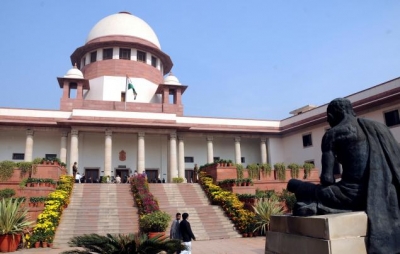New Delhi: The Supreme Court, while hearing a plea seeking contempt action against Gujarat authorities for carrying out demolitions near the famous Somnath temple, on Friday said it would order status quo ante (as it was) if officials acted in contempt of its order.
What was the petition before the SC?
The plea by the Samast Patni Muslim Jamaat sought contempt action against several Gujarat officials for carrying out demolitions in utter disrespect to the SC order passed on September 17, where it had paused all demolition actions across the country, except with its permission.
It said that the demolition of centuries-old Muslim places of worship including mosques, eidgahs, dargahs, mausoleums and residential places of Mutawallis was carried out on September 28 without issuing any notices for such demolition and without granting any opportunity of hearing.
What did SC order on September 17?
Putting a nationwide brake on bulldozer action, the Supreme Court, in an order passed on September 17, directed that no demolition will take place anywhere across the country except without the permission of the top court.
However, it clarified that its “order would not be applicable if there is an unauthorised structure in any public place such as road, street, footpath, abutting railway line or any river body or water bodies and also to cases where there is an order for demolition made by a court”.
What was the Gujarat government’s stand?
Solicitor General Tushar (SG) Mehta said that the state action falls under the “exception” carved by the apex court in its September 17 order since the structures in question were averting the sea and demolitions were carried out in accordance with the due procedure.
He said that though several authorities were approached for an interim injunction, no relief was ever granted.
The SG added that the Gujarat High Court, in a detailed hearing held on Thursday, declined to pass any status quo order, after a petition was “heard at length” in which “dictation of order continued till 4 o’clock”.
What did SC say?
“We will not issue notice, you only file your reply. We will hear it on October 16, file your reply by then,” the SC told SG Mehta, who appeared on behalf of the Gujarat government.
At the same, the top court said that if it is later found that demolitions were carried out in the teeth of its September 17 order, it will “send authorities to jail and ask them to restore the position as it was”.
“If we find the authorities in contempt of our order, not only we will send them to jail, but we will ask them to restore the position as it was. We have made it clear that if they are in contempt, we will pass a status quo ante order.”
Fixing the matter on October 16 for the next hearing, it turned down the request made by senior advocate Sanjay Hedge, representing the petitioner, to pass a status quo order.
Can officials go to jail?
Under the Contempt of Courts Act, 1971, a contempt of court is punishable with simple imprisonment for a term which may extend to six months, or with a fine which may extend to Rs 2,000, or with both.
However, an accused may be discharged or the punishment awarded may be remitted on an apology being made to the satisfaction of the court.
Speaking with IANS, advocate-on-record Anas Tanwir claimed that the state authorities blatantly defied the September 17 order and lowered the majesty of the apex court in the eyes of the general public relaying utter disrespect to its orders.
Can status quo ante (as it was) be granted?
Advocate Tanwir said that the Supreme Court, being the highest court of the land, has vast powers and has been empowered under Article 142 of the Constitution to do “complete justice” between the parties.
The larger issue of demolitions
On Tuesday, a Justice B.R. Gavai-led Bench reserved its decision on laying down pan-India directives governing demolitions after several petitions were filed before the apex court alleging that demolitions were carried out by several state authorities without sufficient notice.
It extended its September 17 order on freezing demolitions across the country without the permission of the top court.
“We do not intend to protect encroachments on public roads, footpaths, railway lines, etc. If there is any religious structure in the middle of the road, be it gurudwara, dargah or temple, it cannot obstruct the public. Public interest and safety is paramount,” the bench reiterated.
“We will ensure that our order does not help encroachers,” it added, clarifying that an illegal structure will have to go if built in contravention of statutory rules.
The top court hinted that it would lay down directives within the framework of municipal law but at the same time guarantee legal remedies to the affected parties.
Demolition drive near Somnath temple
The demolition action in Gujarat, which began on September 27 night, targeted unauthorised structures near the famous Somnath temple with an aim to pave the way for the proposed Somnath Development Project.
As per Gir-Somnath district administration, illegal structures had been constructed without permission on land owned by the Shree Somnath Trust, which oversees the operations of the temple and the Gujarat government.
In January this year, the state authorities initiated a large-scale anti-encroachment operation targeting approximately three hectares (7.4 acres) of illegally occupied land behind the Somnath temple in the district.
However, in its plea, Samast Patni Muslim Jamaat contended that Haji Mangroli Shah Baba’s tomb and surrounding graveyards have existed since the time of the State of Junagadh, with the matter of their ownership and usage being resolved as early as 1903 by a legal resolution passed under the supervision of the Colonel J. M. Hunter Commission.
“This land, measuring 57 acres and 01 gunthas, was allotted to the Muslim community with legal sanction, recognising its sanctity as a burial ground and religious site.”
–IANS


Comments are closed, but trackbacks and pingbacks are open.